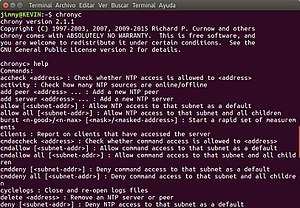chrony
chrony is an implementation of the Network Time Protocol (NTP). It's a replacement for the ntpd, which is a reference implementation of the NTP. It runs on Unix-like operating systems (including Linux and macOS) and is released under the GNU GPL v2.[3] It's the default NTP client and server in Red Hat Enterprise Linux 8 and SUSE Linux Enterprise Server 15,[4][5] and available in many Linux distributions.[6][7][8]
 Screenshot of chronyc | |
| Original author(s) | Richard Curnow[1] |
|---|---|
| Developer(s) | Miroslav Lichvar, Red Hat[1] |
| Stable release | 3.5
/ May 14, 2019[2] |
| Repository | |
| Written in | C |
| Operating system | Unix-like |
| Type | Time synchronization |
| License | GNU GPL v2 |
| Website | chrony |
Comparison with the reference implementation
Unlike NTPsec, chrony was implemented from scratch.[1] It was designed to synchronize time even in difficult conditions such as intermittent network connections (such as laptops) and congested networks.[1] Unlike ntpd, it supports synchronizing the system clock via hardware timestamping, improving accuracy of time synchronization between machines on a LAN.[3] It also supports synchronization by manual input, and can perform time correction within an isolated network.[3]
See also
References
- Linux Foundation (2017-09-28). "CII Audit Identifies Most Secure NTP Implementation". Linux Foundation. Archived from the original on 2018-02-03. Retrieved 2019-10-08.
- "News". chrony.tuxfamily.org. Retrieved 2019-10-08.
- "Comparison of NTP implementations". chrony.tuxfamily.org. Retrieved 2019-10-08.
- "Migrating to chrony". Red Hat, Inc. Retrieved 2019-10-08.
- "Time Synchronization with NTP". SUSE. Retrieved 2019-10-08.
- "chrony". Debian. Retrieved 2019-10-08.
- "chrony". Fedora Packages. Retrieved 2019-10-08.
- "net-misc/chrony". Gentoo Packages. Retrieved 2019-10-08.